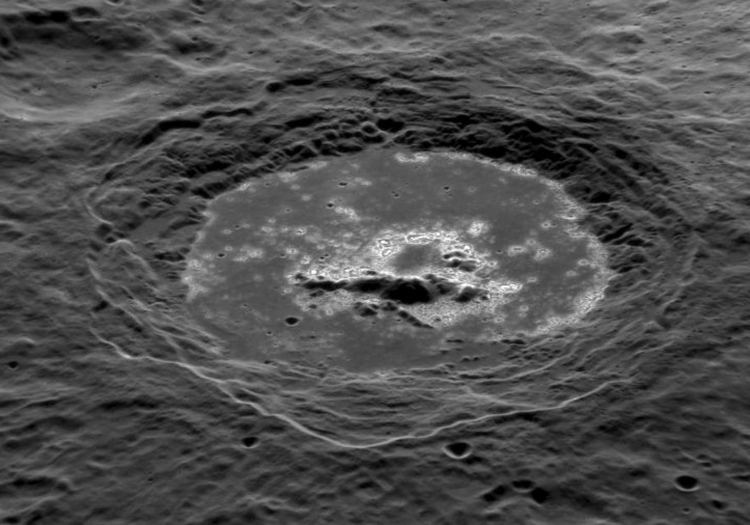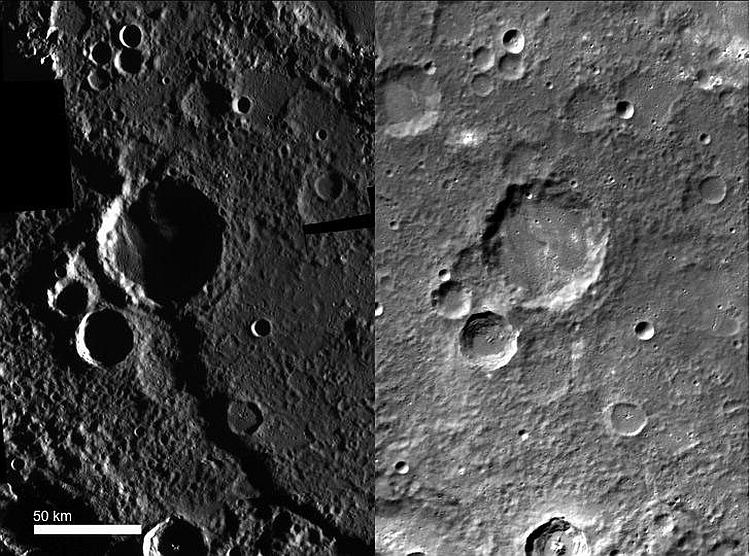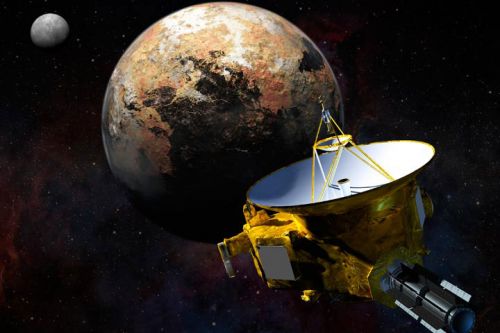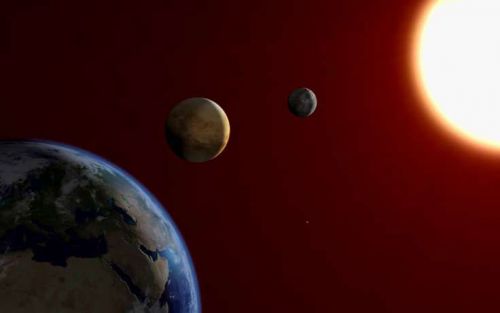Mercury - on this moment considered the smallest of all known planets located in the solar system.

It rotates around the Sun at a distance of 47 million km in a highly elongated elliptical orbit with average speed 48 km/s. There is relatively little information about this planet today, this is due to the fact that Mercury is located very close to the Sun, and this greatly complicates the process of its study.
Epimetheus and Janus are divided into one track
However, none of the hypotheses were confirmed. These two moons of Saturn have the same orbit, so it is possible that it was originally one month. They change position on the track every four years and are at risk of collision. After Ganymede, the second largest moon is probably the strangest solar system. It passes around Saturn and is surrounded by very dense atmosphere. What lies underneath remained very unknown for a long time. Titan's atmosphere contains as much nitrogen as Earth, but also other gases such as methane.
Global map of Mercury compiled using the MESSENGER apparatus
Record temperature changes

This smallest planet in the solar system has the largest surface temperature differences known in this system. This is due to its close proximity to the Sun, the absence of an atmosphere and the relatively slow rotation of the planet itself. Its average daytime temperature is approximately 350 °C above zero, and its nighttime temperature is around 170 °C below zero. The minimum recorded temperature on Mercury is minus 183 °C, and the maximum, achieved in the middle of the day at “hot longitudes” when the planet is located near perihelion, is plus 427 °C. Despite these conditions, modern scientists have suggested the existence of ice on the surface of Mercury.
When methane density is high enough, methane rain can occur on Titan. According to the latest data, there is a network of canals and even lakes into which liquid hydrocarbons flow. There is also volcanic activity here. Beneath the surface of Tyatnov there appears to be a hidden ocean of peace laced with ammonia.
Mercury is closest to the Sun and the smallest and fastest planet in the Solar System. The negative manifestations of this planet can be cunning and lack morality. From the position of this planet, one can easily evaluate intelligence, memory, concentration and special mental capacity. Mercury in the horoscope always points to the area where we have best chance to learning where we can develop intelligence, where we have to learn verbal and written speech, and especially - where we can easily obtain information. It also points to an area where we must learn to observe, analyze and diagnose.
- Mercury rules Gemini and Virgo.
- It controls intelligence, language, communication and business.
- If the horoscope is strictly followed, the person is bright, ready, educated and skillful.
- Mercury often likes to deceive.
Small, but remote...

Mercury is also the smallest planet in the terrestrial group. Its circumference is only 4879.4±1.0 km, which is less than the circumference of Ganymede, a satellite of Jupiter, and Titan, a satellite of Saturn. But, despite its significantly smaller size, due to its huge core, the smallest planet still exceeds these satellites of the giant planets in its mass, which is 3.3 × 10 to the 23rd power of kg. The average density of the relatively small Mercury is slightly less than the density of the much larger Earth and is 5.43 g/cm³, thereby indicating high content metals in its depths.
Venus is named after the goddess of love and beauty. Venus is the brightest object in the night sky through the Moon and is the closest to Earth. In the horoscope it is mainly about relationships and love, inspiring, artistic and creative. If the horoscope is strictly followed, the individual is clearly looking for a relationship and in a partnership he feels satisfied and fulfilled. Negative aspects of Venus can also manifest in promiscuity or fear in relationships. It shows how a person experiences and feels joy and beauty, aesthetic abilities, how he can speak and how he relates to sexuality. In the horoscope, the Venus woman indicates the actions and events that she will affect in her sex, the speed of reaction, the number of opportunities, as well as the area of life in which these important actions will take place. Venus, together with the moon, forms the so-called Moon in a person, which tells how he creates and keeps the family fireplace and Venus, how he relates to his sexuality.
- Venus is ruled by the sign of Libra and the Sign of the Ox.
- It expresses peace, beauty and harmony.
- It is social, tolerant and able to compromise.
- This is a pretty eloquent expression of the type of women he is attracted to.
- So Mars works similarly.
There is no atmosphere and never has been
According to the characteristics of the surface, Mercury is practically a twin of the Moon; it is also very heavily covered with numerous craters, but at the same time its surface is absolutely homogeneous, which serves as its distinctive feature from the Moon or Mars, which have a strong difference between one hemisphere and the other. The lack of surface erosion almost completely rules out theories that Mercury ever had a significant atmosphere. According to available data, the pressure of the atmosphere of this planet is currently 5×10 to 11 times less than the pressure of the Earth’s atmosphere.
In the sky it takes on a reddish hue and is therefore often referred to as the "Red Planet". In the horoscope, these are, in particular, strength, will, physical energy and sexual desire. A person with a strong Mars is predominantly predatory, aggressive, flamboyant, straightforward and seductive. He knows no compromise, and he is often a born nerd and warrior. If its aspects are negative, then they are dissatisfied, cruel and destructive. From a psychosomatic point of view, Mars represents libido and psychic energy, also responsible for the ability to separate.
- Mars rules the sign of Aries and the sign of Scorpio.
- The ancient Greeks assigned Mars as the god of war to Ares.
- He acts unforgivingly, grumpily and dissatisfied if he is strictly followed.
Refuting the presence of a metallic core on Mercury

Canyon on Mercury. Lighting sometimes helps reveal amazing details
Until recently, scientists believed that Mercury consists of a metallic core with a radius of approximately 1900 km, located in the depths and forming 60% of the total mass of the planet, and the surface of this core is covered by a silicate shell approximately 600 km thick. These assumptions were made due to the fact that during the research a very weak magnetic field was discovered, and it was believed that a planet of such small size could not have a liquid core.
Supermassive black hole
This, in turn, is the fifth planet from the Sun. This is more than all the other planets combined. If Jupiter were empty, more than a thousand Earths would fill this space. The name Jupiter acquired according to the Roman god. Jupiter also controls the liver in terms of health and they are safely the largest and heaviest human body. Jupiter is a protector of nature, a lawgiver, acts beneficially and influences growth and progress. It is also characterized by hope, faith, happiness and charity. If the horoscope is strictly followed, the person is generous, optimistic, generous, loves freedom and gives it to others. Such a person can also encourage others and give good advice. However, if Jupiter is negatively assessed, he tends to have a tendency to embarrass himself in everything, he is uneducated, he is dominated by arrogance. This planet symbolizes the search for meaning, the experience of “something higher” and spiritual growth. This planet talks about the area of life in which a person finds support or will support others. It indicates in which areas partnerships should be built and developed. It also indicates the area in which a person will exaggerate and exaggerate in a non-harmonic aspect. This can be very frustrating, people want everything right and without gradual development. A poorly constructed Jupiter then finds it difficult to respect authority, law, the person loses legal process, etc. well built gives wealth, prosperity, high social status, protection, good reputation and dignity. As the signifier of an event, it provides protection, protection, goodwill, legal references and cultural, religious and philosophical activities. As a sign of the people, it ensures nobility and rich people, in the seventh house it is a wonderful constellation for marriage. Saturn, from the point of view Greek mythology, god Chronos, strict, conservative and fair ruler of time, fate, forms and eras. In terms of health, Saturn controls the skeleton, skin, teeth and appearance bodies. If the horoscope is strictly followed, the person is serious, conservative, orthodox, disciplined and has little sense of humor. A typical characteristic of such people is reliability. In negative aspects, Saturn manifests itself in melancholy, slavery, sadness, loneliness and jealousy. From a psychological point of view, this is a depressed personality and suppressed joy in life. This planet makes a person understand and accept the singularity, i.e. universal unity and is also the key to spiritual development. If its principle is accepted and understood, transcendental consciousness arises. Saturn in the human psyche represents, in particular, the desire for awareness, the desire to achieve higher social status. The desire for recognition is a consequence of accepting the order of society, the desire to learn to perfectly respect the laws of society and to stand out on the basis of knowledge and the use of this knowledge. A person, at the expense of enormous sacrifices, achieves a material goal, which is often false. Finding that the goal does not correspond to his ideas and his efforts are not needed is an important principle of the first stage of realizing that the accepted generally accepted norms do not serve proper development, this is the stage when a person begins to realize that he has his own internal norms and rules. If this principle of liberation were not based on the principle of Saturn, anarchy would occur in the Eleventh House, and in the Twelfth it would destroy the integrity of the trinity and harmony of man. On the contrary, Capricorn must develop authority, at least in a lower aspect. In the negative position, it is a fall from a higher social position, followed by poverty, poor living conditions in general, a hard, sad and mournful life. For example, the conjunction of Saturn and the Moon in the state horoscope of the Czech Republic leads to the fact that larger number political parties, which do not cooperate between them, always cause a decrease in the standard of living of the population. Being the banner of people in harmonious activity, he signs his father, especially in the case of a night birth. In addition, the elderly, the Jews, the authorities we come into contact with, the lower aspect of the workers, the sewer and sewer cleaners, the people are still responsible and stable. In the inharmonious effect of lubrication, the complexity of the environment, and in the case of the trinity of water, also alcoholism. In the harmonic aspect of death due to long-term illness and the neutral or bad aspect, the sudden failure of the competent organ ultimately strikes.
- Jupiter rules the sign of Sagittarius and Pig.
- Jupiter - greek god Diem, glorious ruler of the gods.
- Retaining them in surgeries is every new doctor's nightmare.
- One circle of Jupiter lasts twelve years.
- One sign lasts about a year, but it is also subject to possible retrograde.
- Also in this realm the being must develop spiritual life and religion.
- It shows where best to expand, develop and build.
- Hermetics, magic and religion.
- As a signifier of death, it “ensures” a happy, painless death.
- Also, too much rich life.
- Saturn rules the sign of Aquarius and the sign of Capricorn.
- Its typical manifestation is the construction of boundaries and restrictions.
- Feelings of fear and guilt are also common.
- Saturn is often mentioned as the opposite of Uranus, the strict teacher.
- The emergence of effort and the desire to achieve are typical energies of Saturn.
- Knowing that in reality it is actually something else entirely.
- This process of knowing is very important because it serves for liberation.
- An unbalanced way of losing the standard of living.
- As a sign of death, it works if it is somehow related to the eighth house.

But already in 2007, a team of leading astronomers led by Jean-Luc Margot, having analyzed the results of five years of radar observations of this space object, during which they discovered rotation variations that were too large for a planet with a solid core, refuted this theory.
Popular science film about Mercury from the European Space Agency
The most intriguing and mysterious thing for humanity is the Universe. This concept includes a huge space that has no boundaries, it is filled with matter, galaxies, black holes, and this is only what scientists know. Galaxies, in turn, consist of star systems and their clusters. People have always been interested in what space hides. It has long been a known fact that the solar system is not the only one in the entire universe. This system includes the Earth and many other planets.
The solar system is one of the components of the Galaxy. The most important element at the center of the entire system is the Sun, around which the planets revolve. All planets are completely different, not similar to each other. If we consider the surface of each planet, that is, icy and hot, some contain gas, others do not, so they are considered dense. Each planet in the solar system also differs from each other in its size. In this article we will talk about what is the smallest planet in our Solar System and in the Universe.
Planet Pluto
In 1930, Clyde Tombaugh discovered the new planet Pluto. For a long time it was considered a full-fledged ninth planet of the solar system, but since 2006 it began to be considered a dwarf planet. It is the largest and second largest dwarf planet. After this planet was discovered, it was perceived as the farthest, ninth planet in the solar system. It was the appearance of Pluto that marked the beginning of the emergence of such a category as small planets, otherwise they were called plutoids.
Pluto takes 248 years to complete one orbit around the Sun.
Pluto is located 40 astronomical units from the Sun. Accordingly, 40 times further than Earth. If we compare in kilometers, it is about 6 billion kilometers. It was noticed that this dwarf planet has an atmosphere that extends beyond the Earth's atmosphere. But this atmosphere appears when Pluto approaches the Sun. Gravity on Pluto is very weak, since it is many times lighter than Earth. The processes that occur on the planet directly depend on its location, although we can only draw conclusions about this by observing from the outside.
Scientists believe that the Sun should be visible on Pluto and it is not completely dark there. The weather is likely to be bad, with low temperatures and strong winds. There is no data yet on the presence of a magnetic field on this dwarf planet. Pluto is located at a very great distance, so it is difficult to say its exact dimensions, but it is known that its mass is 5 times less than the mass of planet Earth. Astronomers theorize that the planet's surface is made of frozen gases, with one hemisphere of methane ice and the other hemisphere of frozen nitrogen.

In 2006, a spacecraft was sent to the dwarf planet
Not long ago, the title of one of the smallest planets in the Universe passed to another planet called Mercury.
Mercury
Mercury is the planet of the solar system closest to the Sun and it rotates so quickly that ancient civilizations believed that these two were completely different stars, appearing during the day and evening. After Pluto became a dwarf planet, Mercury began to be considered the smallest planet of the eight. Mercury is larger in size than the Moon, but not by much. This is the only planet that has no natural satellites, and a day is equal to 176 days on Earth. The temperature difference during the day is surprising: during the day the indicator rises to 480°C, and at night it drops to minus 167°C. There is no atmosphere on the surface, so the planet is not able to retain heat, and in the shadow the temperature can be noticeably lower, but clouds still form at the poles.
There are some features on the surface of the planet:
- A large number of impact craters that were formed over many billions of years;
- Between the craters there are plains that are believed to have been created by the movement of lava flows in the distant past;
- The presence of rocks that are scattered throughout the surface of Mercury and stretch for several thousand kilometers in length.
In the solar system, Mercury is the smallest planet and at the same time it is one of the few planets that can be seen in a clear night sky with the naked eye. There are five such planets in total.

1 year on Mercury is equal to 88 Earth days
The new smallest planet in the Universe
Scientists managed to discover a planet that was later recognized as the smallest, this happened in 2013. It turned out that it is smaller in size than Mercury and is three times closer to its star than Mercury is to the Sun. High temperatures reign on its surface, reaching up to 425°C. Scientists have given Its name is Kepler-37b.
Unfortunately, there is still little accurate data on the size of the new planet; it is known that in its dimensions it is slightly larger than our Moon. According to astrologers, it consists of stone. The difficulty of studying lies in the fact that the atmosphere interferes with instruments on Earth.
An interesting way to detect large and small planets. Astrologers watch this or that star for a long time and wait for the moment when the light from it fades. This means that some body called a planet passed between the observed star and the earth. However, using this method it is easier to determine which planets are the largest, because most of these planets were much larger than Earth and more comparable in size to Jupiter.

Kepler-37b's dimming was very difficult to notice, but scientists have made a new discovery
For many years, scientists have made assumptions about what lies beyond the solar system. Thanks to the latest developments and equipment, many discoveries have been made that have made it possible to learn more about the Universe as a whole. It is currently impossible to say how many planets there are in total in the Universe. The galaxy contains hundreds of trillions of planets, different sizes and having various features. Of this incredible number, few objects have been studied. It is quite possible that scientists will soon discover a new planet, which will be even smaller than those given in our article.